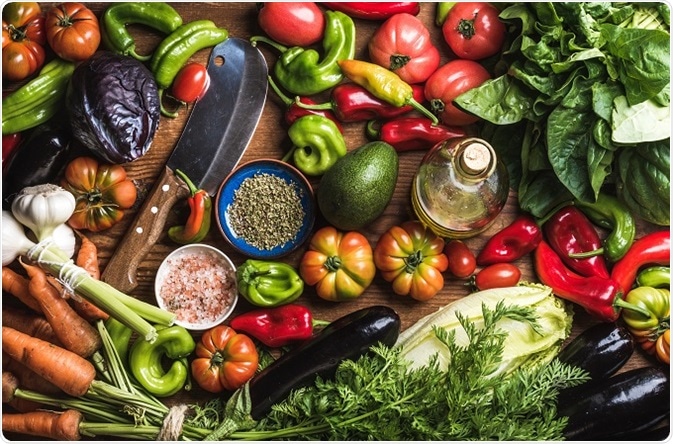Vegetarians form a large group of the population. For those vegetarians who take milk and eggs, a healthy diet is the same as for anyone else but for those who do not take dairy and eggs, diet needs to be carefully assessed.
©Foxys Forest Manufacture / Shutterstock.com
A healthy diet comprises of plenty of fruit and vegetables and starchy foods along with dairy products, non-dairy sources of protein such as eggs and beans and a small amount of fat containing foods.
Balanced diet
The “eat-well” plate eating plan helps in choosing healthy options of food and suggests the proportions of these foods. According to the eat-well plate recommendations:-
- Plenty of fruit and vegetables - This includes at least five portions of fresh, frozen, canned, dried or juiced fruit and vegetables a day. These provide vitamins as well as fibres in diet that helps in maintaining good digestion.
- Plenty of starchy foods such as potatoes, bread, rice and pasta – These should make up at least a third of the food plate. Whole grains are better than polished and refined carbohydrates as they provide more fibres, calcium, iron and B vitamins.
- Dairy products - Milk and dairy products, such as cheese and yoghurt provide protein, calcium and vitamins A and B12. These are important for maintaining calcium balance. Low fat dairy should be chosen as part of regular diet.
- Non dairy sources of protein - Eggs, beans, lentils and peas and other pulses form a good source of proteins. Vegetarians who consume eggs may benefit from these foods.
Those vegetarians who do not take eggs need to rely on legumes and pulses for proteins. These are low-fat source of protein, fibre, vitamins and minerals. Nuts and seeds are also a source of protein and other nutrients.
Other meat alternatives for vegetarians include tofu, mycoprotein (such as Quorn), textured vegetable protein and tempeh. A variety of proteins are suggested to obtain the right mixture of amino acids, which are used to build and repair the body’s cells.
- Foods rich in fats and sugars need to be consumed sparingly. Fatty foods include oils, salad dressings, cream, processed foods, crisps, biscuits, pastries, ice cream, cakes etc. Foods in this group provide empty calories and energy in the form of fats and sugars. They are poor in other essential nutrients.
Vegetarian diets
Vegetarian diets in special conditions like pregnancy need to be planned to include all essential nutrients. Children on a vegetarian diet also need to be assessed for a balanced and healthy diet providing them with nutrients essential for growth and development.
Contrary to popular belief, most vegetarians have enough protein and calcium in their diet. They may fall short of iron requirements compared to meat eaters however. Good sources of iron include pulses, dry fruits, eggs, dark-green vegetables such as watercress, broccoli, spring greens and fortified cereals (with added iron).
Omega-3 fatty acids help maintain a healthy heart and reduce the risk of heart disease. For non-vegetarians, these may be obtained from oily fish. In vegetarians, these are obtained from linseed (flaxseed) oil, walnut oil, rapeseed oil and soya bean oil and omega-3 fortified egg.
For vegans, diet contains only plants, such as vegetables, grains, nuts and fruits. Vegans do not take foods that come from animals, including dairy products. A healthy vegan diet thus needs to include:-
- Plenty of fruit and vegetables
- Starchy foods from wholegrains, potatoes, pasta, bread and rice
- Dairy alternatives such as fortified soya drink. There is a need for calcium supplementation if it is not taken in dairy products. Calcium is needed for strong and healthy bones and teeth. Good sources of calcium for vegans include fortified soya, rice and oats, pulses, sesame seeds, fortified brown or white bread, dried fruit such as raisins, prunes and dried apricots etc.
- Non-dairy sources of protein such as soya, legumes, nuts, seeds, beans and pulses
- Small amount of fatty and sugary foods
Further Reading
Last Updated: Jan 23, 2023